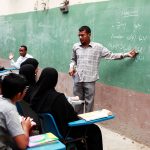Small and Medium Enterprises (SMEs) play an important role in income and employment generation in local economies, and SMEs account for a large share of businesses in low and income countries (LMICs). SMEs in LMICs are concentrated in activities that are described as unorganized or unregistered, or non-institutional. These SMEs have limited access to financial…
Skill Training
Transitions to Adulthood
Increasing schooling, delaying marriage and childbearing, and increasing labour market participation of young women are important policy objectives in Senegal as in many developing countries. These outcomes are tightly linked. Early childbearing may inhibit women’s ability to enter the labour force. Greater schooling and enhanced skill development may substantially mitigate these negative outcomes by increasing…
Punjab Economic Opportunity Program
The Punjab Economic Opportunity Programme: Evaluating Markets for Skill Acquisition and Employment project has examined the complete scope of all relevant decisions being made in the vocational skills market in target districts in Pakistan. This includes determining what courses to offer, examining the drivers of low take-up, relieving access constraints to markets, and returns to…
High-Risk Youth in Post-Conflict Liberia
How can governments and NGOs raise employment and reduce the risk of violence among these poor and risky populations? Aid programmes increasingly focus on helping youth through markets, especially through microenterprise development. The logic of this assistance, however, rests on the existence of market failures among the poorest of the poor: imperfect credit markets, or…
Building Management Hierarchies for Growth in LICs
We evaluate the impact of and demand for mid-level management training in a group of garment factories in Bangladesh. Industry participants recognise that there exists a shortage of skills needed to fill in lower-level management positions. There are several reasons firms may fail to provide socially optimal levels of training, and the project is designed…
Start-Up Capital for Youth
Unemployment among young people is one of the most pressing social and economic problems facing less developed countries today. Data from the 2005 Kenya Integrated Household Budget Survey found that approximately 21% of youths are unemployed, and a further 25% are neither in school nor working. While the traditional academic schooling track offers large labour…
Reducing Extreme Poverty through Skill Training for Industry Job Placement
Bangladesh has been experiencing remarkable growth in the ready-made garments (RMG) industries for the last three decades. It has become an integral and major part of Bangladesh’s economy, which contributes 13 percent of GDP and 75 percent of export earnings. For instance, in 1983 there were some forty thousand people employed in the RMG sector;…
Matched Employee-Employer Panel-Data for Labour Market Analysis in Zimbabwe
Zimbabwe is a low-income economy emerging from years of economic crisis. The crisis had a profound impact on production, employment and human development. The policy challenges to growth and recovery are severe and will require rigorous economic analysis drawing on a detailed understanding of the field and relevant data of a high quality. This project…
Asymmetric Information on the Skills of Workers and Matching in the Labour Market
Youth unemployment is a serious issue in developing countries, where around 60% of young people are currently unemployed or underemployed [ILO 2013]. Understanding the determinants of youth employment in LICs is thus highly policy relevant, not just for policies related to labour market functioning and attachment, but also for those debates related to the incentives…








